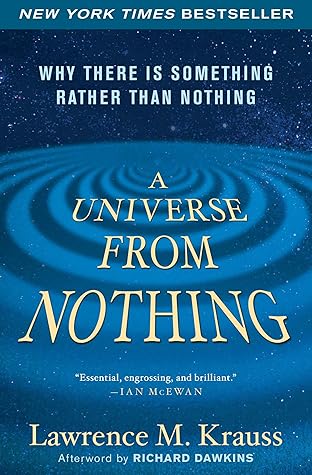More on this book
Community
Kindle Notes & Highlights
(Pluto will always be a planet for me. Not only do I like to annoy my friend Neil deGrasse Tyson by so insisting, but my daughter did her fourth-grade science project on Pluto, and I don’t want that to have been in vain!)
the interests of full disclosure right at the outset I must admit that I am not sympathetic to the conviction that creation requires a creator, which is at the basis of all of the world’s religions.
Nevertheless, the declaration of a First Cause still leaves open the question, “Who created the creator?” After all, what is the difference between arguing in favor of an eternally existing creator versus an eternally existing universe without one?
The universe is the way it is, whether we like it or not. The existence or nonexistence of a creator is independent of our desires. A world without God or purpose may seem harsh or pointless, but that alone doesn’t require God to actually exist.
Science has been effective at furthering our understanding of nature because the scientific ethos is based on three key principles: (1) follow the evidence wherever it leads; (2) if one has a theory, one needs to be willing to try to prove it wrong as much as one tries to prove that it is right; (3) the ultimate arbiter of truth is experiment, not the comfort one derives from one’s a priori beliefs, nor the beauty or elegance one ascribes to one’s theoretical models.
Hubble’s law: There is a linear relationship between recessional velocity and galaxy distance. Namely, galaxies that are ever more distant are moving away from us with faster velocities!
One of the most poetic facts I know about the universe is that essentially every atom in your body was once inside a star that exploded. Moreover, the atoms in your left hand probably came from a different star than did those in your right. We are all, literally, star children, and our bodies made of stardust.
Over the course of the history of our galaxy, about 200 million stars have exploded. These myriad stars sacrificed themselves, if you wish, so that one day you could be born. I suppose that qualifies them as much as anything else for the role of saviors.
The job of physics is not to invent things we cannot see to explain things we can see, but to figure out how to see what we cannot see—to see what was previously invisible, the known unknowns.
“Extraordinary claims require extraordinary evidence.” This
Space is big. Really big. You just won’t believe how vastly, hugely, mind-bogglingly big it is. I mean, you may think it’s a long way down the road to the chemist’s, but that’s just peanuts to space. —DOUGLAS ADAMS, The Hitchhiker’s Guide to the Galaxy
We cosmologists had guessed, correctly it turned out, that the universe is flat, so we weren’t that embarrassed by the shocking revelation that empty space indeed has energy—and enough energy in fact to dominate the expansion of the universe.
Nevertheless, I should stress that the Big Bang picture is too firmly grounded in data from every area to be proved invalid in its general features.
We have come to accept the “Copernican principle” that there is nothing special about our place and time in the universe.
On a slightly less facetious note, the Nobel Prize–winning physicist Frank Wilczek has suggested that string theorists have invented a new way of doing physics, reminiscent of a novel way of playing darts. First, one throws the dart against a blank wall, and then one goes to the wall and draws a bull’s-eye around where the dart landed.
If immutable laws governed the universe, the mythical gods of ancient Greece and Rome would have been impotent. There would have been no freedom to arbitrarily bend the world to create thorny problems for mankind. What held for Zeus would also apply to the God of Israel.
Empty space can have a non-zero energy associated with it, even in the absence of any matter or radiation.
“What I want to know is whether God [sic] had any choice in the creation of the universe.”
1. In quantum gravity, universes can, and indeed always will, spontaneously appear from nothing. Such universes need not be empty, but can have matter and radiation in them, as long as the total energy, including the negative energy associated with gravity, is zero.
If one argues, as many deeply religious individuals do, that without God there can be no ultimate right and wrong—namely that God determines for us what is right and wrong—one can then ask the questions: What if God decreed that rape and murder were morally acceptable? Would that make them so?
Without science, everything is a miracle. With science, there remains the possibility that nothing is.
Reality doesn’t owe us comfort.


